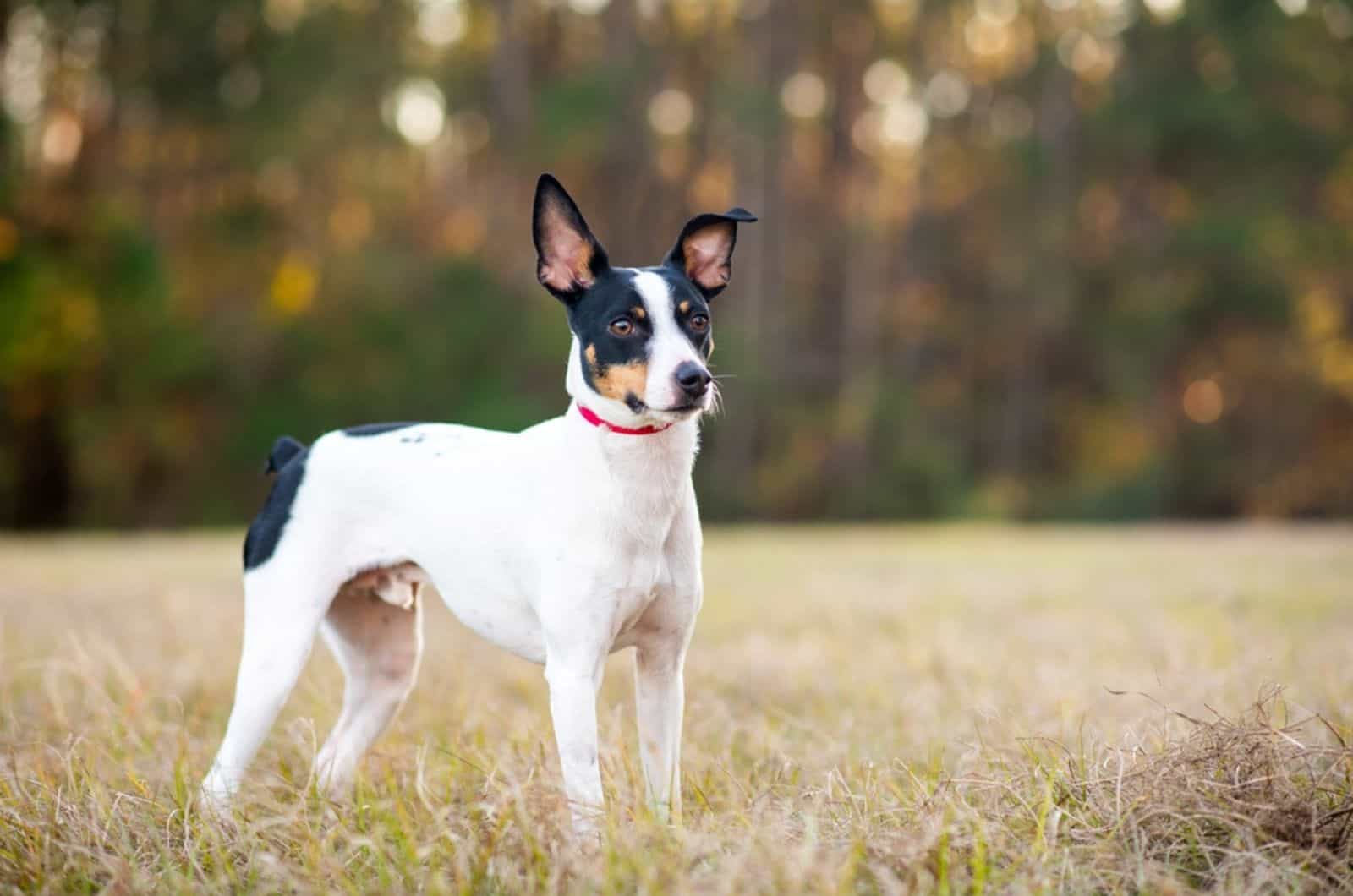If you are interested in learning how big a Rat Terrier gets, then you’ll probably find this Rat Terrier growth chart very useful
The Rat Terrier breed can be a beneficial family member if it is given the proper training and socialization. Not only can they help you get rid of vermin, but they are also competent guard dogs and, of course, loving companions.
Although owners and breeders are aware of the great qualities that set the Rat Terrier apart, it is frequently mistaken for a smooth-coated Fox Terrier or a Jack Russell.
This Rat Terrier growth chart will not only tell you the expected size of these dogs, but it will also include some key info about their development and health. So if you have any interest in that, stick around and keep reading.
Rat Terrier Growth Chart
[table id=702 /]
The Different Sizes Of Rat Terriers
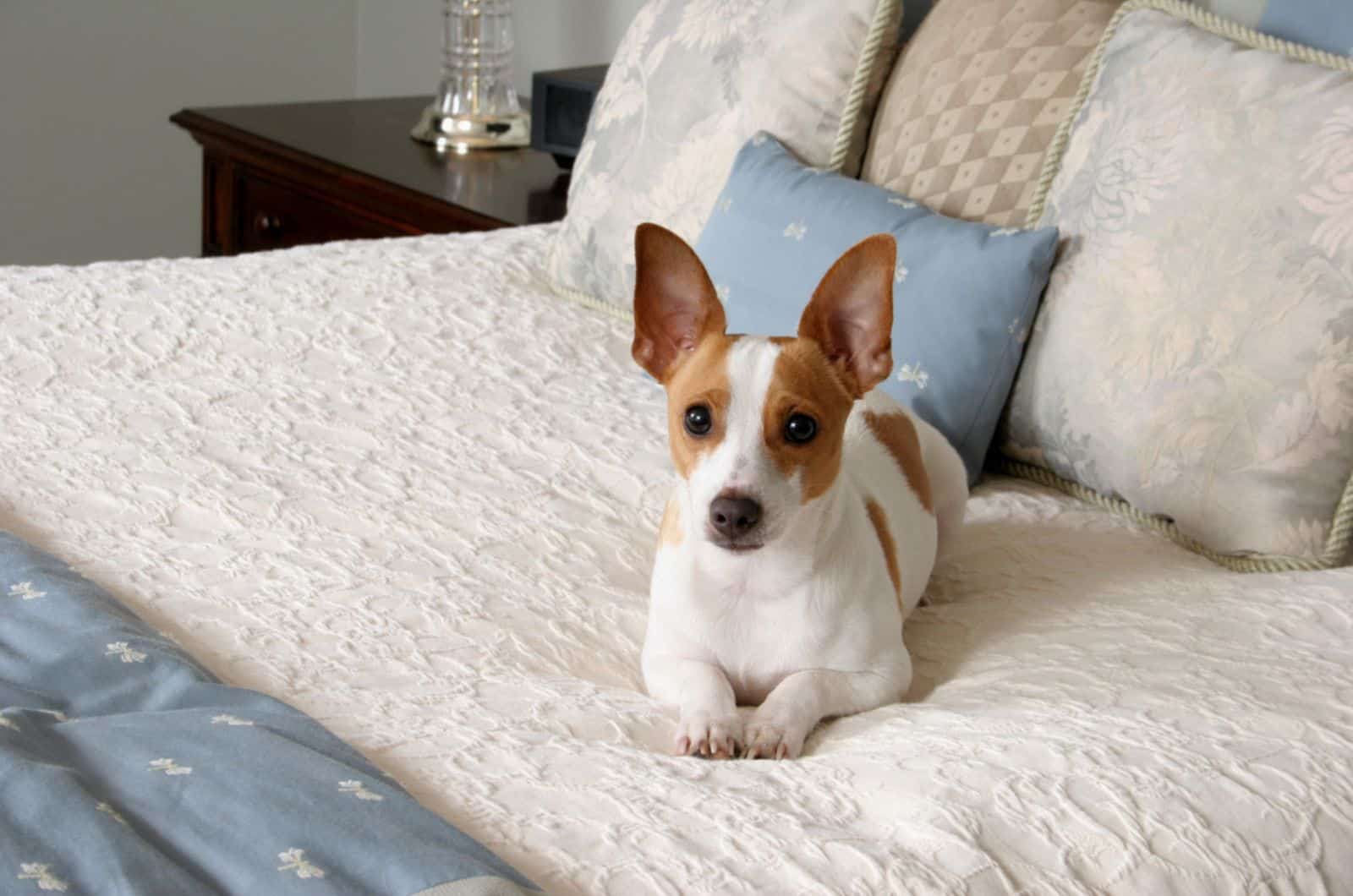
Answering the question “how big does a Rat Terrier get?” is not as straightforward as you might think.
As you can see from the Rat Terrier growth chart above, there are three distinct size categories of these dogs. So, the question should really be more like “how big do Rat Terriers get?”
However, the American Kennel Club (AKC) officially only recognizes two of them, the miniature and the standard Rat Terrier.
Others are not considered to be up to the breed standard, but some breeders still choose to breed them because they have a certain appeal with some people.
Let’s talk about each of those three size categories separately, so that we can get a better overview of them.
Toy Rat Terriers
Toy Rat Terriers are the smallest of the three types, with their adult height not exceeding 8 inches, and their height usually falling in the 4-to-6 pounds range.
They are not considered to be an official size by the AKC and therefore Rat Terriers of these dimensions are not accepted by the club.
Miniature Rat Terriers
Miniature Rat Terriers are bigger than the toy ones, but they are still relatively small, especially compared to the standard Rat Terriers. In fact, you could consider them to be a small dog breed.
They typically grow to be between ten and 13 inches tall at the withers, with their weight maxing out at around eight pounds.
As you can see, there really isn’t a great deal of difference between them and the toy Rat Terriers, except for the fact that these just about make it into the AKC’s official breed standards.
Standard Rat Terriers
And now we come to the big boys and girls. At least relatively speaking.
Standard Rat Terriers are probably the most common type out of the three. With their height being between 13 and 18 inches, and their weight between 10 and 25 pounds (although they can sometimes be even heavier), they can comfortably be considered a medium-sized dog breed.
There is a clear discrepancy between them and the miniature and toy Rat Terriers, which makes them easily recognizable.
Wondering where to get a Rat Terrier? Here is a list of the best breeders in the US.
When Is A Rat Terrier Fully Grown?
Despite their small stature, Rat Terriers grow more slowly from puppyhood to adulthood than a lot of other, similarly-sized, breeds.
In other words, it will take some time for them to attain their full adult size and weight after they have completely finished growing from being puppies.
There is also the fact that they come in three different sizes, so that needs to be taken into account, as well. They will take less time to completely mature if they are tiny, but more time if they are large.
A toy Rat Terrier typically reaches full size between the ages of eight and twelve months, whereas a standard Rat Terrier matures between the ages of 12 and 15 months.
At approximately 18 months to two years of age, the weight of any type of Rat Terrier stabilizes.
Beyond this, any additional weight is more likely to be fat, rather than muscle, which needs to be managed and controlled. Overfeeding or an unsuitable diet are frequently to blame for this.
Another thing that you should bear in mind is that each dog is unique and that yours might mature sooner or later than other puppies from the same litter.
There are many elements at play — more on those later — but if you take good care of your dog from an early age, it should grow to its full potential.
In most cases, you can estimate your dog’s weight before they are even fully grown.
To do this, double the weight you recorded when they were roughly 18 weeks old and you should have a fairly accurate guess of their adult weight.
Growth Stages In Rat Terrier Puppies
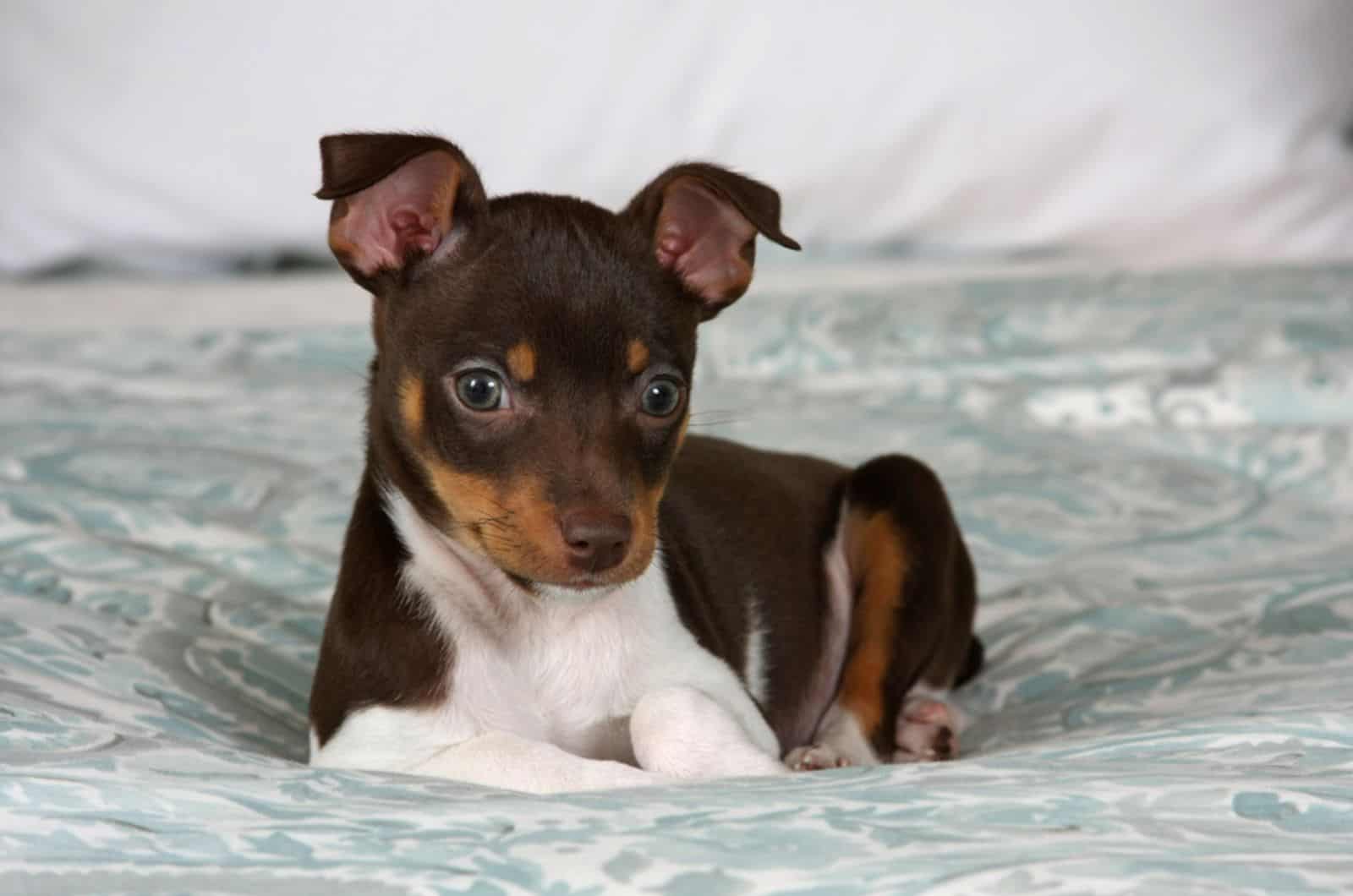
Most pet owners undoubtedly want to know what to anticipate throughout the puppyhood of their Rat Terriers, how to prepare for it, and when puppies start to become easier to handle.
Just knowing the expected height and weight is not enough.
The primary physical and psychological changes that the Rat Terrier puppy‘s body goes through during its first eighteen months of growth are broken down in the sections that follow so that you can get a better idea of what is going on with your pooch in those key moments.
From Birth To Two Weeks
In this stage, known as neonatal, the puppy is regarded as a newborn. The puppy’s eyes and ears are still closed, so they are unable to see or hear.
However, they have acquired senses of touch and scent. At this point, the mother takes care of the puppy’s needs, including feeding, cleaning, and keeping it warm.
Would you prefer a Rat Terrier mix instead? Here is a list of 40 adorable ones!
From Two Weeks To Three Months
For the puppy, this is the stage of transition and socialization. Their eyes and ears open for the first time, enabling them to take in and become conscious of their surroundings.
They can now eat solid puppy food because their first teeth start breaking through.
By the time the puppy is eight weeks old, it should be completely weaned and ready to go to its new home.
Housebreaking, socialization and obedience training can begin as soon as the puppy is at home. At this point, vaccinations and dewormings should also be administered.
From Three Months To Nine Months
Your dog will go through canine puberty during this stage. Increased disobedience, obstinacy, and territory marking will be displayed.
There is no need to be concerned because they may exhibit fear during this period, which is normal. They will also demonstrate their dominance because they want to be the alpha dog, so you will need to be able to assert your own dominance.
They will understand that you are the leader if you provide them with ongoing instruction in obedience and socialization.
Your puppy is energetic at this stage, so playing with them will keep them engaged both mentally and physically.
Additionally, you should probably speak to your veterinarian about spaying or neutering your Rat Terrier now.
From Nine Months To 18 Months
During this stage, your Rat Terrier will grow to adult size and weight, if it’s of the standard variety. If it’s a toy or a miniature one, then it should have been fully grown just before the start of this phase.
At this time, they also exhibit traits indicative of their particular breed, including loyalty, respect, intelligence, and a high level of socialization.
With the assistance of your veterinarian, you should gradually transfer your Rat Terrier from a puppy diet to adult food.
Adult Rat Terriers
When a Rat Terrier reaches sexual, physical, emotional, and mental maturity, it is considered an adult dog.
However, some dogs may never fully develop intellectually and continue to be vivacious, vigilant, feisty, and silly. This is due to the fact that each dog’s mental development is unique.
Your pup requires your care and attention as an adult in order to live longer and be a healthy dog. The job isn’t over just because it isn’t a puppy anymore.
In order to maintain their muscle mass and strengthen their immune system, Rat Terriers must be fed lean protein. Additionally, work out with them and walk them every day to help them stay active and at a healthy weight.
When Do Rat Terriers Mature Mentally?
Some owners claim that a Rat Terrier’s mind never fully develops. In their head, they often just continue to be puppies, constantly on the lookout, active, silly, and feisty.
This may be partially accurate, but we must not equate immaturity with the temperament and characteristics of the breed.
When your puppy starts acting and behaving more like an adult dog, that is when they are considered to be mentally mature.
This kind of maturity cannot be taught and frequently takes a very long time to completely develop. You’ll see small, gradual changes that should serve as a clue that your dog is getting ready to mature a little.
Puppies frequently get into trouble for crossing boundaries that an older dog would not. Your puppy has likely grown up and will likely become a much calmer adult after they learn not to breach these lines.
Do Male And Female Rat Terriers Mature Differently?
The breed’s males are frequently far more friendly and outgoing than its females.
The male Rat Terriers have even more pronounced muscles than the females because they like to play activities that are physically demanding.
Additionally, males are believed to be more emotionally stable than females, and they are much less prone to respond negatively to stress.
Because of their propensity to assert their dominance, they will try to push back against your authority even when they are aware that you are the alpha. Essentially, they will test you.
In their own special way, female Rat Terriers are affectionate. The girls approach you more like a cat would do, winding themselves around your legs and rubbing whereas the boys will straight up jump up into your lap.
The breed’s females have no problems with dominance and are quite content to let someone else take the lead.
When you want your young pups to participate in early obedience training and you have small children in your home, this can be a crucial consideration.
In addition, females appear to learn new things more quickly than males, which suggests that they may be a little smarter.
What Affects The Growth Of Rat Terriers?
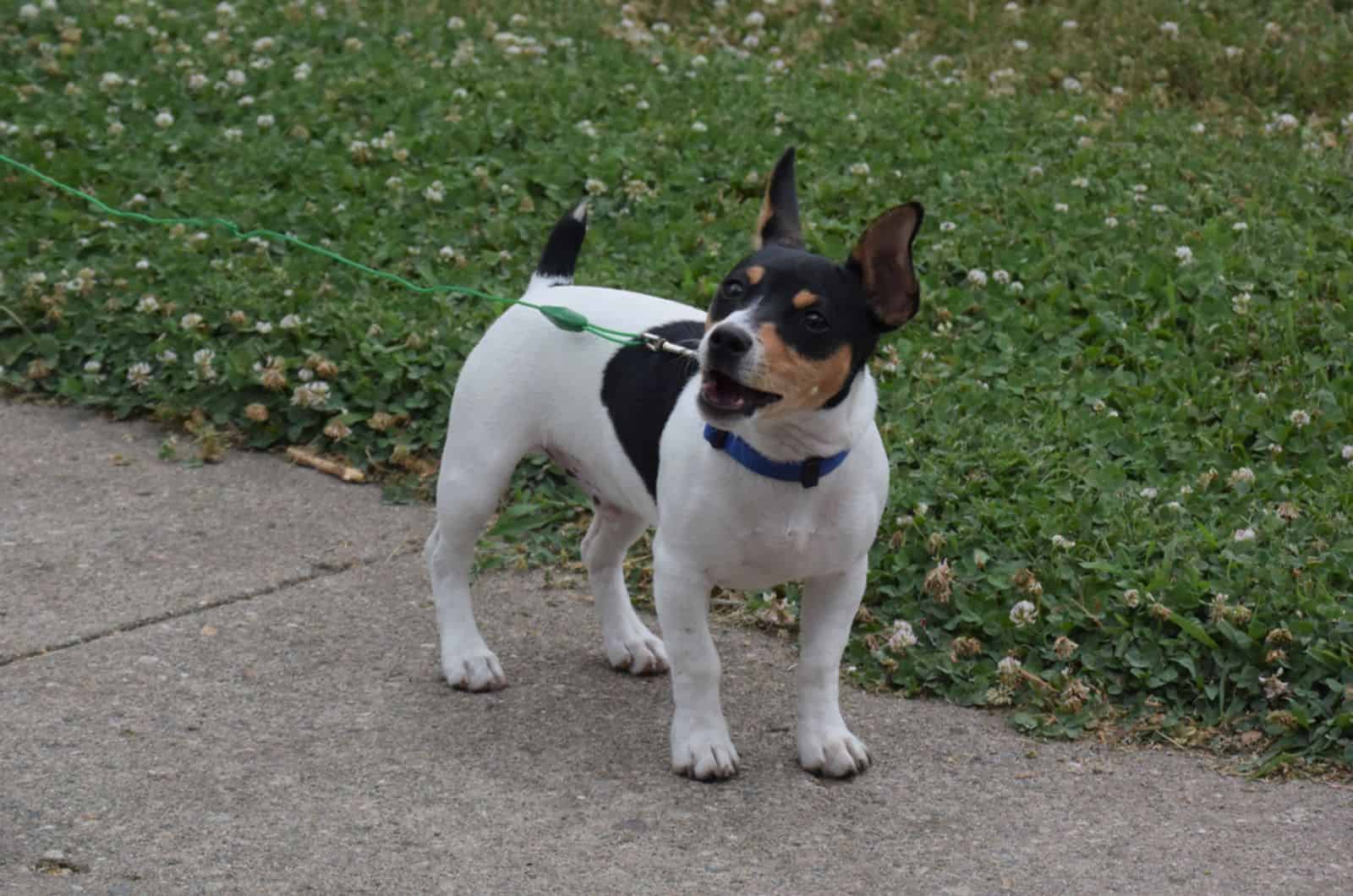
There are many factors at play and their compound influence is so complex that it can be hard to pinpoint why exactly a certain dog is bigger than its brother or sister, for example.
However, there is a degree of certainty behind it that we can explain, and that should be enough of a guide for you to roughly know what to expect.
The factors that shape the growth of a Rat Terrier puppy can be roughly divided into two categories, internal and external.
Internal factors are those that the puppy inherits naturally and there isn’t really much you can do about them. The external factors, however, are very much in your hands and you can use them to maintain your puppy within a healthy weight.
Let’s get into a bit more detail so that you can get a clearer picture.
Genetics
The growth and size of a Rat Terrier are significantly influenced by genetics. The parent breeds’ bloodline and pedigree play a massive role in the size of the Rat Terrier puppies.
Initially, a crossbreed of Manchester Terriers, Old English White Terriers, purebred Beagles, Fox Terriers, Bull Terriers, and other breeds was used to create Rat Terriers.
Rat Terriers were used on farms across the nation to control the number of rats, mice, and other pests since they were bred to hunt. The Rat Terrier got its name from this, and thanks to their slyness and quick reflexes, they were excellent hunters.
Later, to make them even faster, Whippets and Italian Greyhounds were bred into the breeding line. Your pup could be small or medium-sized depending on the lineage line they come from.
Although it’s not always the be-all and end-all, genetics play a major role in size and growth. It’s likely that a litter of pups will have some of the same characteristics of the sire and the dam that produced them.
Of course, there are always exceptions, but in general, you can tell a lot about your pup by looking at its parents.
Gender
Males are a little bit larger than females.
These differences are not that apparent in smaller breeds, so it might be tough to notice them at first, especially in the toy and miniature Rat Terrier types.
However, they should be more visible in the standard ones, where the difference between males and females can often be several inches and up to ten or twelve pounds.
Diet
Whether homemade, completely raw, or purchased, high-quality dog food is required for Rat Terriers to grow and develop properly. To make sure the dog gets the necessary nutrients, the diet should be suitable for its age.
Make sure your Rat Terrier is within the appropriate weight range for its age by keeping an eye on its weight. Always have access to fresh, clean water.
That being said, it can be challenging to determine whether you are feeding your puppy the right quantity of food to maintain its weight at a healthy level for its age and breed.
A simple indication that your puppy might be a little bit underweight is whether or not you can clearly see their ribs.
If so, gradually increase the amount of food at each meal to help them get back on track.
On the flip side, your dog is probably overweight if you cannot see or feel its ribs. You should feed them smaller quantities at mealtime and add more exercise to their daily routine to remedy this.
Speaking of exercise…
Exercise
Rat terriers need outdoor exercises like chasing tennis balls and other amusing pursuits. To keep your dog from straying off the leash, exercise it inside an enclosed area.
They require space and time to run because they are lightning-quick and full of energy. To keep your Rat Terrier from being destructive, they need to exercise for at least 40 minutes each day.
Like a lot of Terrier breeds, they have a fairly high prey drive, so they need a good amount of physical and mental stimulation to prevent any aggressive urges. Early socialization and living around other family pets will also help with this.
Dogs can grow and change in size depending on how often and how hard they exercise.
For instance, dogs that are always on the move may maintain their current weight and not appear to be growing at all, but they most likely have long, lean, and powerful muscles.
Health And Growth Of Rat Terriers
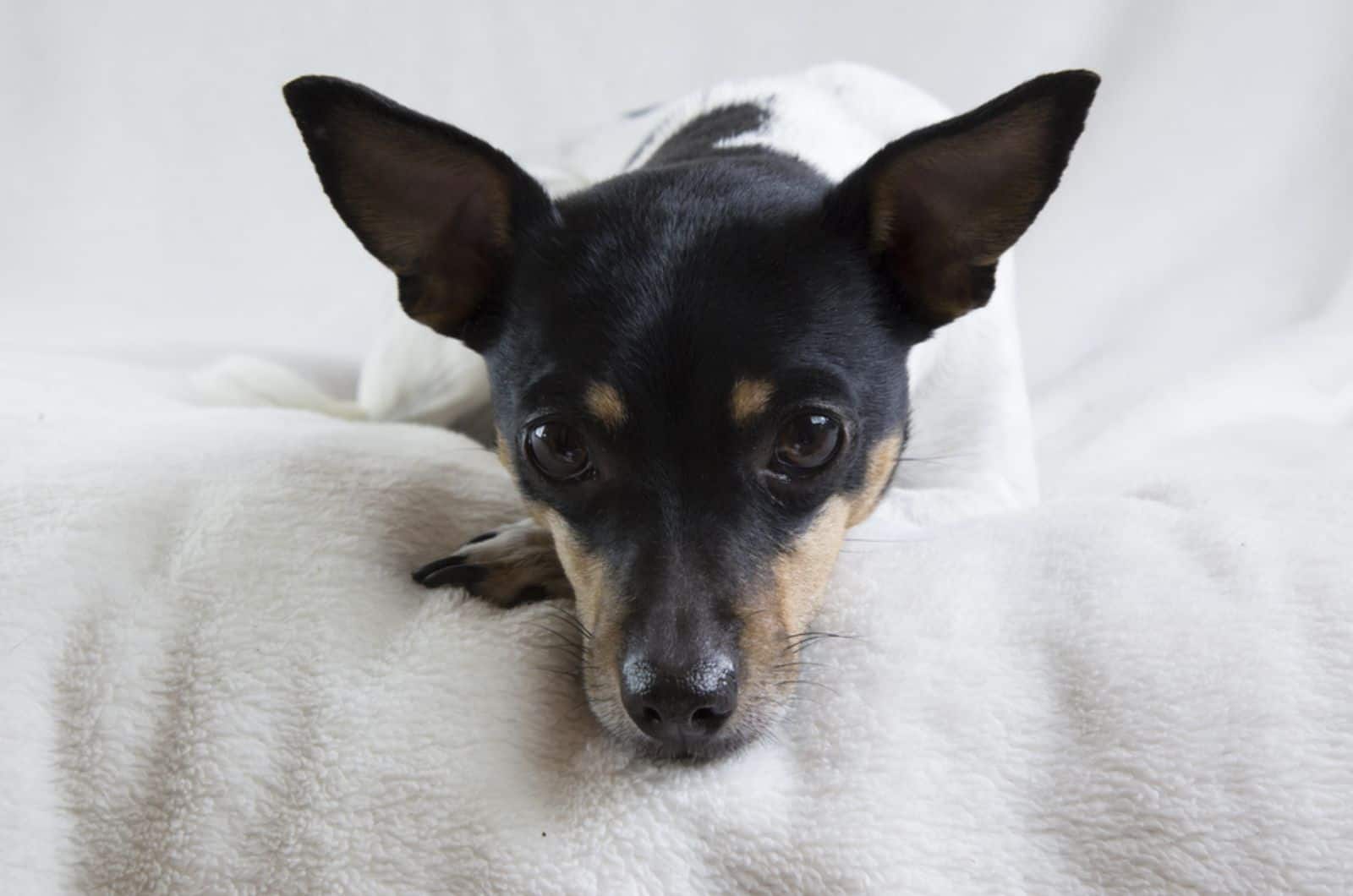
A dog’s ability to grow can be hampered by a number of inherited medical conditions, but there are also other health problems that develop gradually over the course of a dog’s life and in some way restrict or obstruct the animal’s ability to develop.
One of the most common health problems is patellar luxation, but there are others, as well.
Consequentially, noticing that your Rat Terrier is perhaps not on the right track when it comes to its growth could be a sign that something more serious is going on and that would be a signal for you to take it to the vet.
And since they are a small breed, Rat Terriers can be in danger of obesity, so you need to be careful to ensure that they remain within their average size by preventing weight gain.
You can do this by sticking to a healthy diet and by satisfying the dog’s exercise needs.
Spaying/Neutering
When a female dog is spayed, her uterus and ovaries are removed, whereas when a male dog is neutered, only his testicles are removed.
When your Rat Terrier is between the ages of four and nine months, you should do these operations.
Your dog may grow taller than average if spaying or neutering is performed too early because they lack the hormones that signal the growth plates to close. For precise information on when to spay or neuter your Rat Terrier, speak with your veterinarian.
How To Use The Rat Terrier Growth Chart
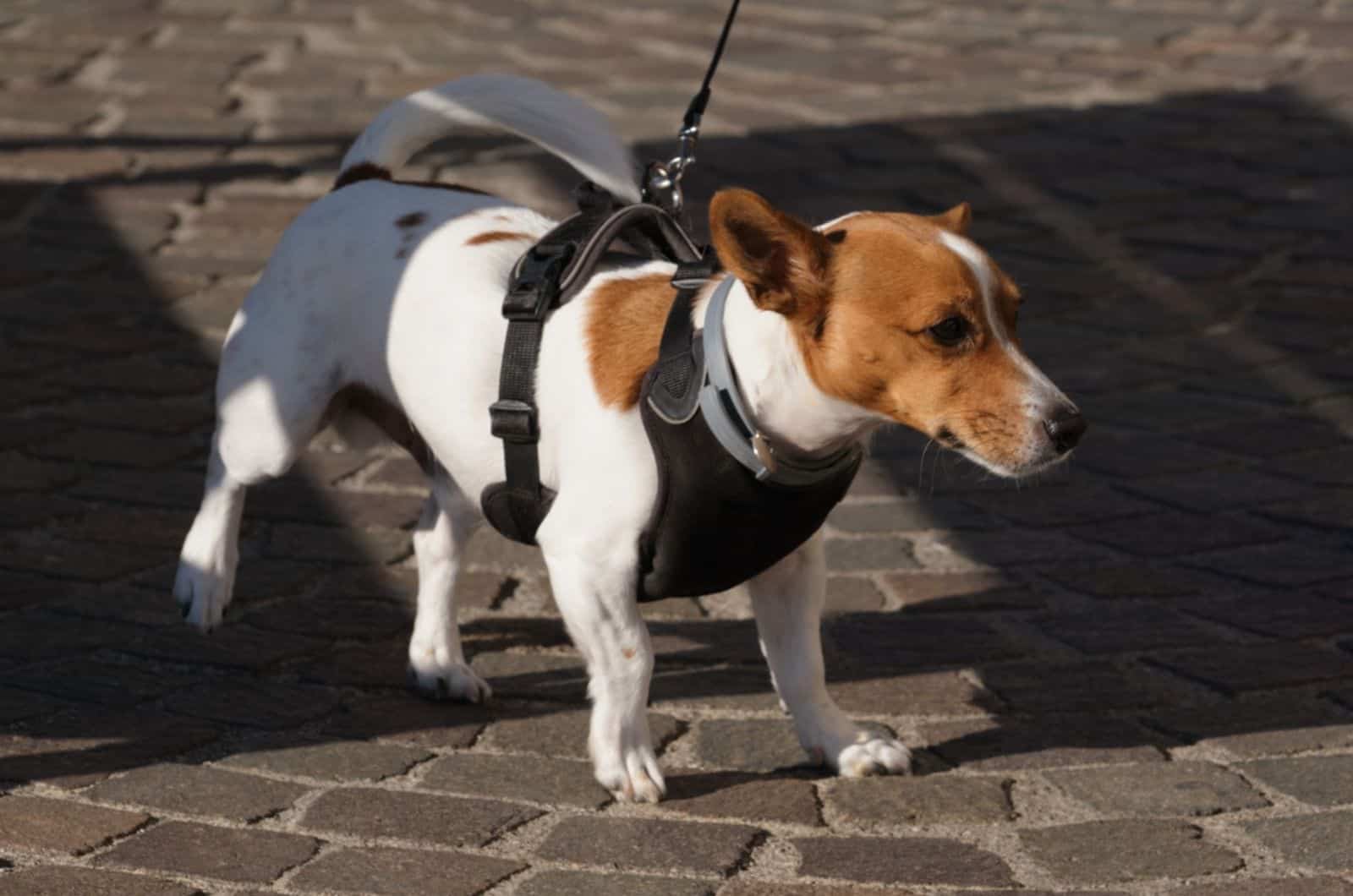
You can keep track of your puppy’s growth and make sure its weight is on the right path by using our Rat Terrier growth chart.
Furthermore, knowing how big and how heavy your Rat Terrier should be at a certain age can help you plan its diet and living situation.
In the broadest sense, the size chart will help you make sure your Terrier doesn’t become overweight or underweight.
How To Measure The Weight Of Your Rat Terrier
Regular weighing is essential if you want to make sure that your dog is growing as expected.
Over the course of its life, tracking a Rat Terrier’s weight is a fantastic approach to monitoring its health.
You can determine the mass of your Rat Terrier using one of two methods. The first approach is quite straightforward and just requires you to weigh your dog once on a regular bathroom scale.
If your dog is unable to stand alone on a scale for some reason, you can climb on it while holding your pet, weigh both of you together, and then deduct your own weight from that number.
How To Measure The Height Of Your Rat Terrier
A dog’s height is measured from the ground to the withers.
Before placing the measuring tape on the ground and moving it straight up toward the withers, make sure your dog is standing straight.
We have a comprehensive article about measuring your dog correctly if you’d want more information.
Conclusion
If you want to welcome a Rat Terrier into your home, there are several considerations you should make.
This Rat Terrier growth chart is a useful tool that can assist you in keeping track of your pet’s development by ensuring that its growth is proceeding according to plan.
If you put in the necessary time and effort, you will be rewarded with a fun, loving, and friendly dog that will remain devoted to you for the duration of its lifespan.
And they also come in a lot of cute colors!
If you decide to get one, be sure to use our Rat Terrier growth chart as a guide to determine what size it will eventually be as an adult.
